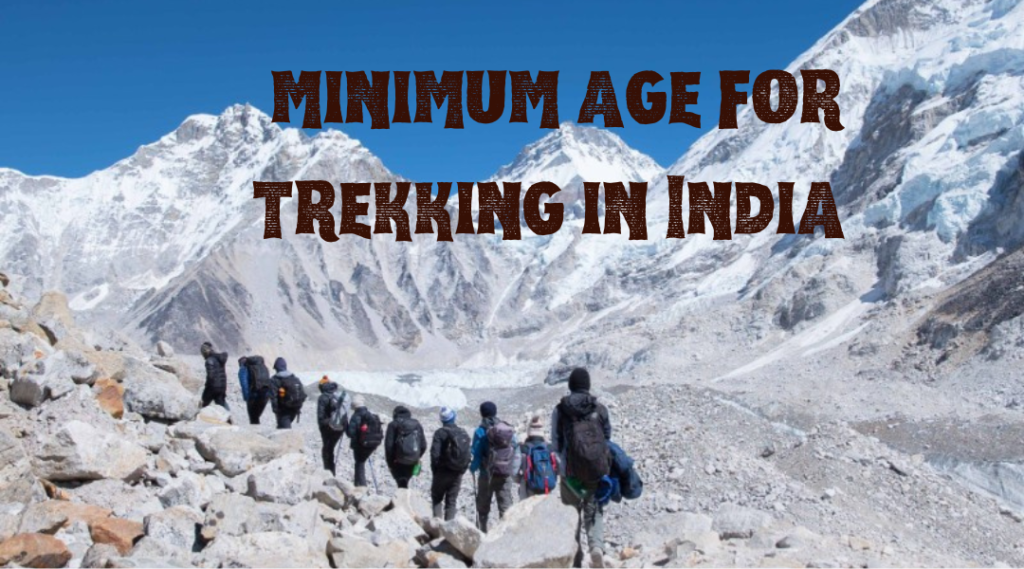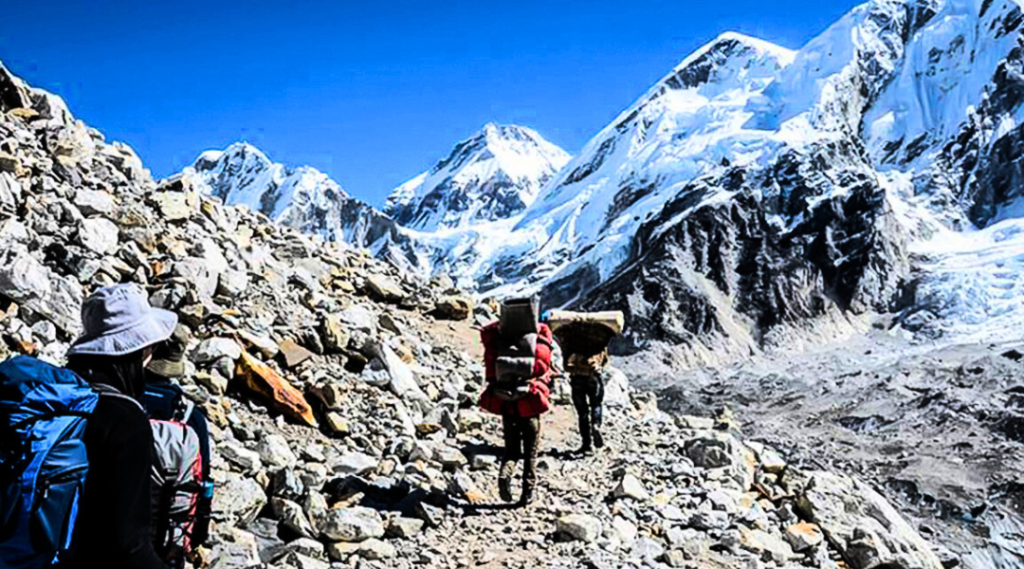Trekking in India is an adventure seeker’s paradise, offering breathtaking landscapes and diverse terrains to explore. However, when it comes to trekking, safety is a paramount concern, especially for younger enthusiasts. In this article, we will delve into the minimum age for trekking in India, ensuring a safe and enjoyable experience for all.

Understanding Trekking in India
Before we discuss age restrictions, let’s grasp the essence of trekking in India. Trekking involves hiking through rugged terrain, often in mountainous regions, and can range from easy walks to challenging high-altitude treks. India’s vast geographical diversity provides an array of trekking options, from the lush trails of the Western Ghats to the mighty peaks of the Himalayas.
Minimum Age for Trekking in India
The minimum age for trekking in India can vary depending on several factors, including the trek difficulty, altitude, and the trekking company’s policies. However, there are a few general principles to take into attention.:
1. Easy Treks
For easy treks in the lower regions of India, such as those in Himachal Pradesh, Uttarakhand, or Kerala, the minimum age for trekking in India is typically around 6 to 8 years. These treks are suitable for families with children and provide a great introduction to the world of trekking.
2. Moderate Treks
Moderate treks, which may involve longer durations and slightly higher altitudes, often set the minimum age at 10 to 12 years. Trekking destinations like Manali, McLeodganj, and Shimla fall under this category.
3. High-Altitude Treks
High-altitude treks in the Himalayas, such as the famous Roopkund or Stok Kangri treks, are challenging and demanding. The minimum age for trekking in India is usually 14 to 16 years due to the physical and mental stamina required to endure the harsh conditions at higher altitudes.
4. Trekking with Professional Guidance
Some trekking organizations may permit younger participants, even on high-altitude treks, provided they are accompanied by experienced guides or are part of specially organized family treks.
Factors Influencing Age Restrictions

The age restrictions for trekking are primarily in place to ensure the safety and well-being of participants. Here are some factors that influence these restrictions:
Altitude-Related Risks
At higher altitudes, individuals, especially young children, are more susceptible to altitude sickness.If not treated properly, the condition may be serious. Hence, age restrictions are often enforced to minimize these risks.
Physical Fitness
Trekking involves long hours of walking and carrying backpacks. Younger participants must have the physical fitness required to complete the trek without straining themselves.
Mental Preparedness
Trekking can be mentally challenging, especially when facing adverse weather conditions or physical fatigue. Older participants tend to handle such situations better due to their mental maturity.
Safety Tips for Young Trekkers
If you are planning a trek with younger participants, here are some essential safety tips:
- Choose the Right Trek: Opt for treks that match the age and experience levels of the participants.
- Health Check: Ensure that all participants, regardless of age, undergo a medical check-up before embarking on a trek.
- Acclimatization: Spend a day acclimatizing to higher altitudes before starting the trek, especially for high-altitude treks.
- Proper Gear: Invest in suitable trekking gear and clothing for all participants, including children.
- Hydration and Nutrition: Stay well-hydrated and provide balanced nutrition throughout the trek.
Conclusion
Trekking in India is an exhilarating experience that can be enjoyed by individuals of various ages. While age restrictions are in place for safety reasons, with proper planning and guidance, trekking can be a memorable adventure for the whole family.
Now, you may be wondering about a few common questions related to trekking in India. Let’s address some FAQs:
FAQs
- Can children below the minimum age trek in India? In some cases, children below the minimum age can trek if accompanied by experienced guides or on specially designed family treks.
- What are the essential items to pack for a trek with kids? Pack warm clothing, comfortable footwear, first-aid supplies, and plenty of snacks and water.
- How can I help my child acclimatize to high altitudes? Gradual ascent, staying well-hydrated, and monitoring for symptoms of altitude sickness are key.
- Are there age restrictions for easy treks too? Yes, even easy treks may have age restrictions, although they are generally more lenient.
- What are some family-friendly trekking destinations in India? Some family-friendly options include Manali, McLeodganj, and Rishikesh, which offer a range of easy to moderate treks.
Remember to prioritize safety and enjoy the beauty of India’s pristine landscapes responsibly. Happy trekking!
What is the minimum age for trekking in India?
Trekking in India is an adventure seeker’s paradise, offering breathtaking landscapes and diverse terrains to explore. However, when it comes to trekking, safety is a paramount concern, especially for younger enthusiasts. In this article, we will delve into the minimum age for trekking in India, ensuring a safe and enjoyable experience for all.

Understanding Trekking in India
Before we discuss age restrictions, let’s grasp the essence of trekking in India. Trekking involves hiking through rugged terrain, often in mountainous regions, and can range from easy walks to challenging high-altitude treks. India’s vast geographical diversity provides an array of trekking options, from the lush trails of the Western Ghats to the mighty peaks of the Himalayas.
Minimum Age for Trekking in India
The minimum age for trekking in India can vary depending on several factors, including the trek difficulty, altitude, and the trekking company’s policies. However, there are a few general principles to take into attention.:
1. Easy Treks
For easy treks in the lower regions of India, such as those in Himachal Pradesh, Uttarakhand, or Kerala, the minimum age for trekking in India is typically around 6 to 8 years. These treks are suitable for families with children and provide a great introduction to the world of trekking.
2. Moderate Treks
Moderate treks, which may involve longer durations and slightly higher altitudes, often set the minimum age at 10 to 12 years. Trekking destinations like Manali, McLeodganj, and Shimla fall under this category.
3. High-Altitude Treks
High-altitude treks in the Himalayas, such as the famous Roopkund or Stok Kangri treks, are challenging and demanding. The minimum age for trekking in India is usually 14 to 16 years due to the physical and mental stamina required to endure the harsh conditions at higher altitudes.
4. Trekking with Professional Guidance
Some trekking organizations may permit younger participants, even on high-altitude treks, provided they are accompanied by experienced guides or are part of specially organized family treks.
Factors Influencing Age Restrictions

The age restrictions for trekking are primarily in place to ensure the safety and well-being of participants. Here are some factors that influence these restrictions:
Altitude-Related Risks
At higher altitudes, individuals, especially young children, are more susceptible to altitude sickness.If not treated properly, the condition may be serious. Hence, age restrictions are often enforced to minimize these risks.
Physical Fitness
Trekking involves long hours of walking and carrying backpacks. Younger participants must have the physical fitness required to complete the trek without straining themselves.
Mental Preparedness
Trekking can be mentally challenging, especially when facing adverse weather conditions or physical fatigue. Older participants tend to handle such situations better due to their mental maturity.
Safety Tips for Young Trekkers
If you are planning a trek with younger participants, here are some essential safety tips:
- Choose the Right Trek: Opt for treks that match the age and experience levels of the participants.
- Health Check: Ensure that all participants, regardless of age, undergo a medical check-up before embarking on a trek.
- Acclimatization: Spend a day acclimatizing to higher altitudes before starting the trek, especially for high-altitude treks.
- Proper Gear: Invest in suitable trekking gear and clothing for all participants, including children.
- Hydration and Nutrition: Stay well-hydrated and provide balanced nutrition throughout the trek.
Conclusion
Trekking in India is an exhilarating experience that can be enjoyed by individuals of various ages. While age restrictions are in place for safety reasons, with proper planning and guidance, trekking can be a memorable adventure for the whole family.
Now, you may be wondering about a few common questions related to trekking in India. Let’s address some FAQs:
FAQs
- Can children below the minimum age trek in India? In some cases, children below the minimum age can trek if accompanied by experienced guides or on specially designed family treks.
- What are the essential items to pack for a trek with kids? Pack warm clothing, comfortable footwear, first-aid supplies, and plenty of snacks and water.
- How can I help my child acclimatize to high altitudes? Gradual ascent, staying well-hydrated, and monitoring for symptoms of altitude sickness are key.
- Are there age restrictions for easy treks too? Yes, even easy treks may have age restrictions, although they are generally more lenient.
- What are some family-friendly trekking destinations in India? Some family-friendly options include Manali, McLeodganj, and Rishikesh, which offer a range of easy to moderate treks.
Remember to prioritize safety and enjoy the beauty of India’s pristine landscapes responsibly. Happy trekking!
